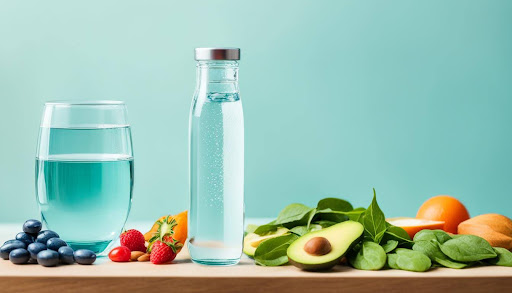Vorteile von Magnesium für Frauen: Was Sie wissen müssen

Do you know how important magnesium is for women's health? This vital mineral is key in hundreds of body processes. It helps with things like keeping our bones strong and our minds healthy. However, many women in the Netherlands and the U.S. don't get enough magnesium in their diets.[1] In this article, we'll look at the great things magnesium can do for women. We'll also give tips on how to make sure you get enough through what you eat and extra supplements.
Key Takeaways:
Magnesium is a crucial mineral that supports various aspects of women's health, from bone health to mental well-being.
Many women do not get enough magnesium in their diet, leading to a potential deficiency.
Erwachsene Frauen sollten 310 bis 320 mg Magnesium pro Tag zu sich nehmen, während Schwangere 350 bis 360 mg zu sich nehmen sollten. [1]
Magnesium-rich foods include leafy greens, nuts, seeds, and oily fish. [2]
Magnesium supplements can help address deficiencies and provide additional health benefits.

Einführung in Magnesium und seine Bedeutung für Frauen
Magnesium ist der Schlüssel zur Gesundheit und zum Glück von Frauen. Es unterstützt über 600 Körperreaktionen, wie die Energiegewinnung und Muskelbewegung. Etwa 60 % des Magnesiums im Körper befindet sich in den Knochen. Der Rest befindet sich in Muskeln, Weichteilen und Körperflüssigkeiten. [3]
Die Rolle von Magnesium im weiblichen Körper
Many women in the U.S. don’t get enough magnesium. This is a big deal because magnesium helps with hormones, keeps bones strong, and helps the heart work right.[3]
Around half of adults, including women, don't get the needed daily amount of magnesium. [4]
Prävalenz von Magnesiummangel bei Frauen
Eine zu geringe Magnesiumzufuhr ist für Frauen eine große Sorge. Studien zeigen, dass bis zu 60 % des Magnesiums einer Frau in ihren Knochen vorhanden sein können.[3] As women get older, they might absorb less magnesium, which can lead to not having enough. [3] Women also tend to eat less magnesium than men. This can cause problems like not feeling hungry, being tired, and weak. [5]
For women, keeping magnesium at the right level is very important. It helps with many healthy things, such as keeping hormones balanced and the heart healthy. [3] Wenn Frauen wissen, wie wichtig Magnesium ist, können sie darauf achten, durch gute Lebensmittel oder Nahrungsergänzungsmittel ausreichend davon zu sich zu nehmen. Auf diese Weise können sie ihre Gesundheit besser unterstützen.
Magnesium and Premenstrual Syndrome (PMS)
Many women find dealing with premenstrual syndrome (PMS) tough and bothersome. They experience issues like bloating, cramps, tiredness, and changes in mood. Yet, studies show magnesium might help lessen these symptoms. [6] It's known that taking magnesium regularly may ease menstrual cramps by relaxing the uterus. This also lowers the pain during periods. [6]
Research proves that increasing magnesium intake can reduce PMS signs. For instance, a group of women with PMS saw their symptoms drop when they took magnesium combined with vitamin B6. Symptoms included feeling down, anxious, bloating, physical discomfort, and strong food cravings. [7] Besides, for three months, taking 500 milligrams of calcium carbonate twice daily led to less tiredness, fewer appetite changes, and lower mood swings in women dealing with PMS. [8]
Magnesium seems key in helping with PMS as it affects hormone levels and cuts down on swelling. [6] It also might improve how insulin works, lessening PMS signs related to a condition affecting metabolism called Polycystic Ovarian Syndrome (PCOS). [6]
Good studies support magnesium's positive effects on PMS. Still, there needs to be more research to be sure how well magnesium really works. [6] Yet, adding magnesium-rich foodsor supplements to your diet is a safe, natural way to maybe help with PMS symptoms.
Remember, while magnesium is good for PMS, it's not the only answer. A mix of a good diet, routine exercise, and stress control tips could also help with PMS symptoms. [8] Talking to a health expert is important to figure out the best personal plan for dealing with PMS.
Supplement | Dosage | Effect |
Magnesium | 360 mg per day | Helps with symptoms like bloating, fluid retention, and breast tenderness |
Calcium carbonate | 500 mg twice a day | Reduces fatigue, changes in appetite, and depression in women with PMS |
Essential Fatty Acids (EFAs) and vitamin E | 2 grams per day | Significantly improved PMS symptoms after 3 months of treatment |
Chasteberry extract | 1 tablet per day | Improvements in physical and psychological PMS symptoms |
Ginkgo leaf extract | 3 times a day | Significantly reduced PMS symptoms in one study |
To sum up, magnesium can play a big role in dealing with PMS. It helps manage common issues like bloating, cramps, mood swings, and cravings. [6] Even though we need more studies, using magnesium through food or as a supplement might offer real help for the problems PMS brings.
Magnesium und Linderung von Menstruationsbeschwerden
Magnesium ist dafür bekannt, dass es bei vielen Frauen Menstruationsbeschwerden lindern kann. Es wirkt, indem es die Muskelbewegungen reguliert und Gebärmutterentzündungen lindert. [9] Some research shows that taking magnesium supplements may cut down on how painful cramps are. This could be a natural way to deal with the pain without needing strong medicines. [9,10]
How Magnesium Helps Alleviate Menstrual Cramps
Studien bringen Magnesium mit dem Kampf in Verbindung inflammationand unwinding muscles. [9] This mineral seems to help control muscle movements and soothe womb swelling, helping to lower cramp pain. [9] Around 80% to 90% of women with cramps might find some relief with magnesium supplements. [10]
But, we still need more studies to know exactly how magnesium helps with cramps. [9] If your periods are very painful, magnesium might help. But it's also important to check for other issues like PCOS, endometriosis, or Hashimoto's for longer pain relief. [9]
Combining magnesium with vitamin B6 might be better at reducing cramp pain. [11] Magnesium citratenot only helps with cramps but also eases constipation. [9] A mix supplement of magnesium citrate, glycinate, and malate is seen as a good choice for overall health. [9]
Start with 200-250 mg of magnesium each day for cramp relief. It might take two months of steady use to see big changes. [9] Remember, many people lack enough magnesium in their diets. Adding foods rich in magnesium like pumpkin seeds and chia seeds is a smart move. [9]
„Magnesium ist ein lebenswichtiges Mineral für die Gesundheit der Frau, und sein Potenzial zur Linderung von Menstruationsbeschwerden stößt auf wachsendes Interesse und wird zunehmend erforscht.“
Magnesium and Pregnancy
Magnesium is key during pregnancy. It's vital for the baby's growth and the mother's health. If you're expecting, you need more magnesium. This helps support you and your baby.
Magnesiumbedarf während der Schwangerschaft
Schwangere Frauen benötigen täglich etwa 300 bis 400 Milligramm Magnesium. Diese Menge ist höher, um den neuen Bedarf des Körpers zu decken. Es unterstützt auch das Wachstum des Babys, hält den Blutdruck normal und sorgt für eine ordnungsgemäße Funktion von Muskeln und Nerven. [12,13]
Benefits of Magnesium for Pregnant Women
Getting enough magnesium is good for pregnant women. It might lower the chance of problems like preeclampsia and having a small or stillborn baby. [12,13]
Magnesium can even fight off postpartum blues by helping produce serotonin. [12] It also strengthens bones and eases those painful muscle cramps many women feel. [12]
But some people are more likely to lack magnesium. This includes pregnant women, those with gut issues, diabetes, those who drink a lot, and older folks. [12] Talk to your doctor to make sure you're getting enough magnesium during pregnancy.
A 2017 study found that taking a 300mg magnesium tablet daily for a month helped a lot. It cut down on problems during pregnancy. [12] Other studies highlight that 300-400 mg daily supports a healthy pregnancy. [13]
While magnesium usually does no harm, watch out for some medicine mix-ups. [12] Magnesium sulfate, however, works well to prevent preeclampsia. [12]
So, making sure you get enough magnesium while pregnant is very important for you and your baby. Your doctor can guide you on the right amount for you.
Magnesium Benefits for Women
Magnesium ist für die Gesundheit von Frauen von entscheidender Bedeutung. Es unterstützt nicht nur die Fortpflanzung.It's great for sleepand can lower anxiety and depression levels. [14]
Improved Sleep Quality
Magnesium is key for balancing sleep chemicals. [14] It calms the nervous system, making it easier to fall asleep and stay asleep. [14] Einige Untersuchungen zeigen, dass Magnesium im Alter beim Schlafen hilft. [14]
Reduced Anxiety and Depression Symptoms
Studies say magnesium might ease anxiety and depression. [14] It works by reducing stress and enhancing brain function. [14] For PMS-linked anxiety, magnesium could be a game-changer. [14]
Eating more magnesium-rich foods or taking supplements helps improve sleep and mental health. [14] Your doctor can recommend the right amount of magnesium for you. [15]
"Magnesium plays many roles in our bodies, from sleep to mental health. Increasing magnesium can boost well-being."
Magnesium für die Knochengesundheit bei Frauen
Strong and healthy bones are key for women, especially as they get older. Magnesium is crucial for building and keeping bone strong. It's known to help prevent osteoporosis. [16]
Die Rolle von Magnesium bei der Osteoporose-Prävention
Etwa die Hälfte des Magnesiums im Körper befindet sich in den Knochen. [16] Dies zeigt, wie wichtig es für die Knochengesundheit ist. Eine erhöhte Magnesiumzufuhr führt zu stärkeren Knochen und einem geringeren Risiko von Brüchen. [17] Women with osteoporosis usually have low magnesium levels. [18]
Außerdem wurde ein Magnesiummangel bei allen Menschen mit einem höheren Frakturrisiko in Verbindung gebracht. [18] Getting enough magnesium is important to keep bones healthy with age. You can get magnesium from food or supplements.

Studies show magnesium is key, especially for women with certain health issues. For instance, people with chronic kidney disease or sickle cell anemia might have low bone mineral density because of magnesium deficiency. [18]
Ein hoher Magnesiumspiegel ist für die Knochen von Frauen von entscheidender Bedeutung. Er hilft, Osteoporose und Knochenbrüche zu vermeiden. [16,17,18]
Magnesium und Herzgesundheit für Frauen
Magnesium is crucial for keeping our hearts healthy, especially for women. [19] It controls blood pressure, sugar, and cholesterol, lowering the chance of heart problems. [19] More magnesium in your diet means less risk of heart disease, stroke, and high blood pressure. [19] Die Einnahme von Magnesiumpräparaten hilft bei schlechtem Cholesterin, Blutzucker und der allgemeinen Gesundheit Ihres Herzens, wenn Sie unter Magnesiummangel leiden. [19] So, adding magnesium-rich foods or supplements to your daily routine can greatly help your heart.
Für Männer beträgt die empfohlene tägliche Magnesiummenge 420 Milligramm, für Frauen über 31 sind es 320 mg. [19] These numbers change depending on age and gender. For example, teen girls need 360 mg daily, while those 19 to 30 need 310 mg. And women 31 to 50 require 320 mg. [20] If you're pregnant or breastfeeding, your needs might be higher, ranging from 310 to 400 mg, also based on your age. [20]
Many things can affect how much magnesium your body has. This includes what you eat, how well your kidneys work, and your age. Health issues like preeclampsia, not eating enough, or conditions that make you pee a lot can also lower your magnesium. [19] Taking certain drugs, like diuretics for blood pressure, might lead to less magnesium in your body. This is more likely if you're taking lots of these drugs or losing a lot of fluid. [19]
Eating foods with more magnesium might help with metabolic syndrome in older Americans. [21] Das Metabolische Syndrom ist ein Problem, das Ihr Risiko für Herzkrankheiten und Diabetes erhöht. Eine Studie zeigte, dass Menschen in Europa und Nordamerika am wenigsten Magnesium zu sich nehmen. [21] But adding magnesium supplements can make your blood vessels work better if you have heart artery disease. [21] It can also lower blood pressure in those who have trouble using insulin or have other chronic illnesses. [21]
To keep your heart in good shape, it's essential for women to get enough magnesium. [19] Adding magnesium-rich foods or supplements to your meals can make a real difference. [19,20,21]
Magnesiumreiche Lebensmittel für Frauen
Getting enough magnesium from food is key for women's health. [22] Good sources are leafy greens, nuts, and whole grains. [23] Eating these foods helps women meet their daily magnesium needs. This supports their health in general.
Leafy Green Vegetables
Spinachis a top magnesium source. A cup of cooked spinach has 158 mg of magnesium. This is 37% of what you need in a day. [22] Andere Grünpflanzen mit hohem Magnesiumgehalt sind Grünkohl und Mangold.
Nuts and Seeds
Almonds, cashews, and pumpkin seeds are full of magnesium. [23] An ounce of almonds has 76 mg, cashews 83 mg, and pumpkin seeds a big 168 mg. [23] Chia seeds and peanut butter are also great sources.
Whole Grains
Der Verzehr von Vollkornprodukten ist eine gute Möglichkeit, Magnesium aufzunehmen. Quinoa enthält 118 mg Magnesium pro gekochter Tasse. [23] Auch Naturreis, Hafer und Vollkornweizen sind reich an Magnesium. [24] Wählen Sie auch mit Magnesium angereicherte Frühstückszerealien.
Denken Sie daran, dass die Verarbeitung den Magnesiumgehalt von Lebensmitteln senken kann. Wählen Sie daher ganze, unverarbeitete Produkte. [22] A mix of magnesium-rich foods ensures women get what they need. This helps their health and well-being.
"Magnesium is essential for hundreds of biochemical reactions in the body, making it crucial for women's health and well-being." [22,23,24]
Magnesium Supplements for Women
Many women might need magnesium supplements.A balanced diet with magnesium-rich foods is best. But, nearly half of Americans may not get enough magnesium from food. [25] Teens and adults are often low on magnesium. Supplements are a way to make sure you get enough of this vital mineral.
Arten von Magnesiumpräparaten
Magnesium supplements come in many types, each offering different benefits. Varieties like magnesium citrate, magnesium glycinate, magnesium oxide, and magnesium chloride are available.
Dosage Recommendations for Women
Adult women should aim for 310 to 320 milligrams of magnesium daily. [15] Those 14 to 18 years old need a bit more, about 360 milligrams. [15] The general supplement dose is 200 to 400 milligrams a day. But, always talk to your doctor first before starting magnesium supplements.
There are side effects to watch for, like nausea and cramps. Too much magnesiumcan cause serious issues. The safe upper limit for supplements is 350 milligrams a day. [26]
Magnesium Supplement | Potential Benefits |
Magnesium Citrate | Better absorbed, may help with constipation |
Magnesium Glycinate | Gentler on the digestive system, may help with stress and anxiety |
Magnesium Oxide | Inexpensive, may help with migraines and high blood pressure |
Magnesium Chloride | Readily absorbed, may help with muscle cramps and pain |
Choosing the right magnesium supplement is important for your health. Talking to a health expert can help pick the best one for you. [26]

Magnesium supplements are good for women's health but use them carefully. With your doctor's advice and knowledge about the types and doses, you can boost your health safely. [15,25,26]
Potential Side Effects and Interactions
Magnesium supplements are usually easy on the body. But, it's wise to know about any issues they might cause, like upset stomach or diarrhea. [27] Außerdem verträgt sich Magnesium möglicherweise nicht gut mit einigen Medikamenten, wie etwa Diuretika oder Herzmedikamenten. [28]
For women, talking to a doctor before taking magnesium is a must. This is especially true if you're already on meds or have health problems. Taking too much might lower your blood pressure or make you feel tired and weak. [28]
Es ist wichtig, die empfohlene Dosis einzuhalten. Ein Gespräch mit Ihrem Arzt kann auch etwaige Bedenken ausräumen. So sind Sie auf dem richtigen Weg für die sichere Anwendung von Magnesiumpräparaten. Eine Überprüfung aus dem Jahr 2021 zeigte, dass Magnesiumpräparate im Vergleich zu Scheinmedikamenten den Blutzucker senken und die Wirkung von Insulin bei Menschen mit Diabetes oder einem Risiko dafür steigern. [27]
In 2017, a study discovered that taking 248 milligrams of magnesium chloride daily for six weeks helped people with depression and anxiety symptoms feel better than those who took a placebo. [27]
Research has found that having more magnesium in your blood could help with keeping your blood sugar in check, especially for people with diabetes types 1 and 2. [27]
As of 2022, it seems that taking magnesium supplements could reduce how often migraines happen, cost less, and have fewer side effects than common migraine meds. [27]
Magnesiumform | Bioavailability |
Magnesium Oxide | Low [28] |
Magnesium Citrate | High [28] |
Magnesiumacetyltaurat | High [28] |
Magnesiummalat | High [28] |
Magnesium Glycinate | High [28] |
A 2021 review found that folks with high blood pressure might need a lot of magnesium, at least 600 milligrams daily, to lower their blood pressure effectively. [27]
Laut einer Studie aus dem Jahr 2022 kann der Verzehr von magnesiumreichen Lebensmitteln zu einem besseren Schlaf verhelfen. [27]
„Mehr als die Hälfte aller Amerikaner erreicht nicht die empfohlene tägliche Magnesiumzufuhr von 310 bis 420 Milligramm.“ [27]
Some experts think we need more magnesium than we're told for the best health. They suggest getting more through what you eat or with supplements. [27]
Magnesium and Hormonal Balance in Women
Magnesium is key in controlling female hormones and keeping them balanced. [29] Es ist entscheidend für die Produktion und Verwendung wichtiger Hormone wie Östrogen. Wenn der Magnesiumspiegel schwankt, können bei Frauen Probleme wie PMS oder unregelmäßige Perioden auftreten. [29] Luckily, getting enough magnesium from food or pills can help keep hormones in check.
Die Rolle von Magnesium bei der Regulierung weiblicher Hormone
For women with hormone problems like PMS or thyroid issues, magnesium is a must. [29] Fast jede Frau, die ihre Geschichte erzählte, brauchte mehr Magnesium. [29] Stress und unser hektisches Leben führen oft dazu, dass wir nicht genug Magnesium bekommen. Dies kann hormonelle Probleme verschlimmern. [29]
Magnesium ist für viele Körperfunktionen äußerst wichtig, von der Stresskontrolle bis hin zur Sicherstellung, dass Insulin richtig funktioniert. [29] It helps our bodies make the hormones we need. And, it can even prevent us from getting up to pee at night. This makes our sleep better and our hormones happier. [29]
Dark chocolate and sunflower seeds are good magnesium sources. But, sometimes we need more than food. Using Epsom salt in a bath or a special magnesium oil on your skin is a great way to up your magnesium intake. [29] These methods also help your body use magnesium better, especially if your stomach has trouble absorbing it. [29]
"Magnesium affects at least 300 enzymatic reactions in the human body, many of which impact hormonal balance." [30]
Around 80% of Americans don't get enough magnesium. [30] Ein Magnesiummangel ist eng mit Stress verknüpft. [30] It takes a lot of magnesium to process sugar. That means more sugar in our diet can further drain our magnesium levels. [30]
Die moderne Landwirtschaft beeinflusst den Magnesiumgehalt unserer Lebensmittel. Außerdem kann die Einnahme bestimmter Medikamente die Menge an Magnesium verringern, die wir aufnehmen. Dazu gehören Medikamente wie Verhütungsmittel und Medikamente gegen Diabetes. [30] Diseases like diabetes can also mess with how we absorb and use magnesium. [30] Wenn Sie ständig müde sind, Kopfschmerzen haben oder schlecht schlafen können, leiden Sie möglicherweise unter Magnesiummangel. [30]
Today, many face magnesium shortage due to health issues, meds, and food quality. [31] Menschen mit Diabetes leiden häufig unter Magnesiummangel. Daher müssen wir auf unsere Magnesiumzufuhr achten. [31] Adults over 31 should ideally get 420 mg a day if they're men, and 320 mg if they're women. [31] Taking magnesium supplements can be a simple way to check if you need more. [31]
Some types of magnesium are better absorbed by our bodies than others. Choosing the right kind, like magnesium glycinate, can really make a difference. [31] Die Kombination von Magnesium mit Taurin hilft nicht nur bei der Aufnahme, sondern bringt auch zusätzliche gesundheitliche Vorteile. [31] Taurine is especially good for our bones and other important functions. [31] Und vergessen Sie nicht, magnesiumreiche Lebensmittel wie Blattgemüse und Nüsse zu essen. [31]
Magnesiummangel bei Frauen: Anzeichen und Symptome
Magnesium is key for women’s health but many don’t get enough. [32] Around 2–15% of Americans lack magnesium, with more risks in hospitals, for those with diabetes, and who drink. [32] It's important for women to know the signs and symptoms. This knowledge can help them act to solve the issue.
Fatigue, cramps, and nausea are common in magnesium-deficient women. [32] So are loss of appetite and numbness or tingling in the arms and legs. Without enough magnesium, symptoms can get more serious. This includes muscle twitches, tremors, and in severe cases, seizures or convulsions. [32]
Lacking magnesium might also make mental health worse. This can show up as apathy, stress, depression, or anxiety. [32] Women with digestion problems, diabetes, or on specific drugs are at higher risk. [32] Magnesiummangel wird auch mit Osteoporose in Verbindung gebracht, einer Krankheit, die die Knochen brüchig und anfällig für Brüche macht. [32]
Feeling tired and weak, having nerve and muscle issues, can be due to lack of magnesium. [32] Studies on animals hint magnesium low levels may spike blood pressure, a heart disease risk. [32] An irregular heartbeat, or arrhythmia, is a serious risk of magnesium deficiency. It can lead to heart palpitations and increase stroke or heart failure risks. [32]
Viele Menschen erreichen die Magnesiumzufuhrziele nicht. [32] Um dies zu beheben, können Frauen magnesiumreiche Lebensmittel in ihre Ernährung aufnehmen. Dazu gehören Samen, Nüsse, Getreide, beans, and veggies. If needed, they can also take supplements. [32]
Das Wissen über Magnesiummangel hilft Frauen, Verantwortung für ihre Gesundheit zu übernehmen. Es ist entscheidend für ihr Wohlbefinden.
Conclusion
Magnesium is a key mineral essential for women’s health. It helps lessen menstrual cramps and PMS signs. [33] It also boosts bone and heart health. [33, 34] Dennoch nehmen bis zu 60 % der Erwachsenen in den USA nicht genug Magnesium über ihre Ernährung auf. [34]
Knowing how critical magnesium is for women is crucial. By eating magnesium-rich foods or taking supplements, women can improve their health. Magnesium aids in more than 300 bodily processes. [33] It helps balance hormones, key for menstrual and menopausal health. [33] Lack of magnesium raises the risk of diabetes and obesity in women. [35]
Frauen können Maßnahmen ergreifen, um sicherzustellen, dass sie genügend Magnesium bekommen. Durch Ernährungsumstellung oder Nahrungsergänzungsmittel ist es möglich, den Magnesiumspiegel zu erhöhen. Auf diese Weise können Frauen von den vielen gesundheitlichen Vorteilen dieses Minerals profitieren und ihre Lebensqualität verbessern.